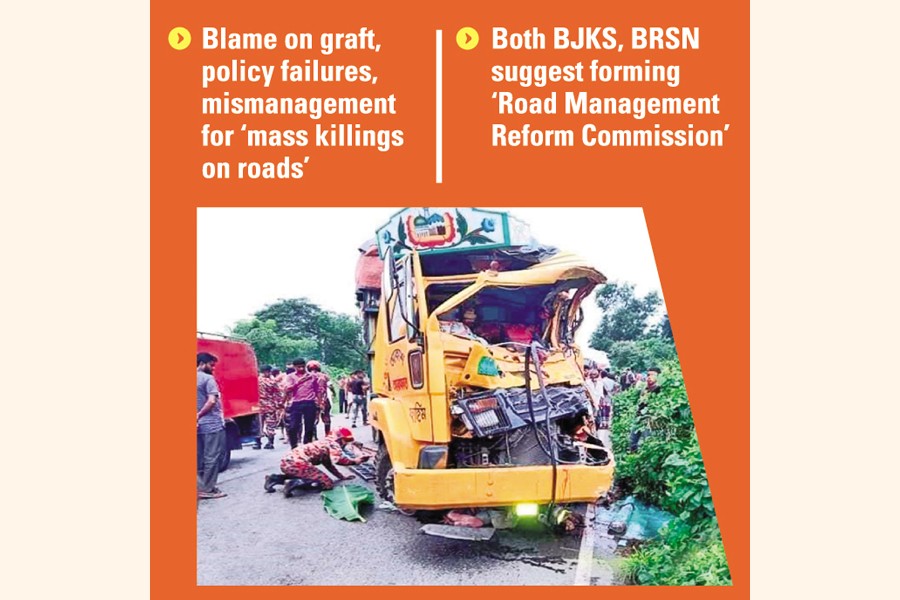
Published :
Updated :

Bangladesh has witnessed a total of 116,726 deaths and 165,021 injuries in 67,890 road accidents over the past 12 years, according to the Bangladesh Jatri Kalyan Samiti (BJKS).
The organisation blamed widespread corruption, policy failures, and mismanagement in the transport sector for what it termed "mass killings on the country's roads".
Speaking at a press conference, organised on the occasion of National Road Safety Day 2025 at the Dhaka Reporters Unity (DRU) on Tuesday, BJKS secretary general Mozammel Haque Chowdhury said the country's road situation has turned into an "alarming humanitarian crisis".
"Before the independence, 80 per cent of passenger movement in the country took place through water and rail routes, and only 20 per cent through roads. But after the Independence, under donor-driven prescriptions and flawed government policies, massive investments were made in road expansion, while rail and water transport were ignored. Now 80 per cent people depend on roads, and road accidents have increased by the same proportion."
Citing data, compiled from media reports between 2014 and September 2025, he said the number of casualties on the country's roads in the last 12 years exceeds the total deaths in wars, such as the ongoing Gaza conflict and the Russia-Ukraine war.
"The number of people killed on our roads is several times higher than those killed in those wars. This is not merely negligence, but a national tragedy."
Mr Chowdhury accused the former Awami League government of institutionalising chaos in the transport sector through unbridled corruption, extortion, and mismanagement involving transport owners, workers, and a section of corrupt police officials.
"Unfit vehicles, unlicensed and underaged drivers, reckless driving, and drivers' use of drugs have made our roads a death trap."
The BJKS leader proposed forming a 'Road Management Reform Commission' to coordinate policies, ensure transparency, and modernise traffic management system. He also urged the government to revive rail and river transport to reduce excessive dependency on roads.
The BJKS has put forward a 12-point recommendation to prevent further casualties on the country's roads. It has suggested introducing mass rapid transit systems - including underground metro - and dedicated bus rapid transit (BRT) lanes in major cities as well as strengthening national bus network from districts to upazilas.
The press conference was also attended by BJKS president Sharif Rafiquzzaman, Bangladesh Reconditioned Vehicles Importers and Dealers Association (BARVIDA) president Abdul Haque, and Drivers Welfare Association chairman Badal Ahmed, among others.
Meanwhile, the Bangladesh Road Safety Network (BRSN) also urged the government to form a 'Road Management Reform Commission' to ensure a sustainable and safe transport system across the country, saying that the sector remains plagued by mismanagement, corruption, and poor coordination even after 54 years of the Independence.
At a press conference, held at another DRU auditorium on the day, the BRSN presented a 20-point demand, including the formation of the commission. It emphasised sustainable transport strategies and institutional reforms to restore discipline on roads and reduce the alarming rate of road crashes.
The organisation also called for formation of a politically-neutral public transport system, ensuring professional benefits and job security for drivers, and withdrawal of expired vehicles from roads.
The BRSN is an umbrella platform comprising several organisations working on road safety and public advocacy. Its members include the Road Safety Foundation (RSF), Nirapad Sarak Andolon (NISA), Bangladesh Society for Change and Advocacy Nexus (B-SCAN), Eventful Bangladesh Society, Nusrat Jahan Toma Foundation, Seba Bangladesh Foundation, Thoughts & Through, and Center for Work and Occupational Health Safety.
Through this coalition, the BRSN aims to push for comprehensive road management reforms, safer public transport, and institutional restructuring to reduce road accidents and improve urban mobility across the country.
BRSN coordinator Pahari Bhattacharjee said the absence of a sustainable transport policy has resulted in chaotic road conditions, unsafe public transport, and frequent fatal accidents that cause immense human and economic losses.
"Each road death is not just a statistics - it represents a family's lifelong sufferings and a blow to national productivity," he said.
According to the BRSN, over 500,000 expired vehicles are still in operation, contributing significantly to daily accidents, which it termed as "structural killings".
RSF executive director Saidur Rahman, NISA president Abdullah Mehedi Deepto, and B-SCAN executive director Salma Mahbub, among others, were present at the press conference.
sajibur@gmail.com


 For all latest news, follow The Financial Express Google News channel.
For all latest news, follow The Financial Express Google News channel.